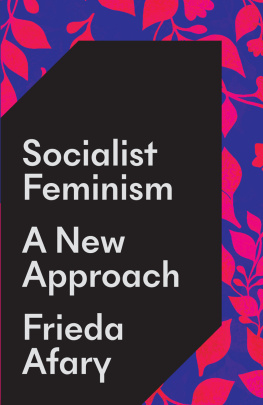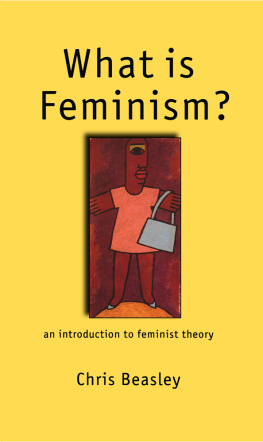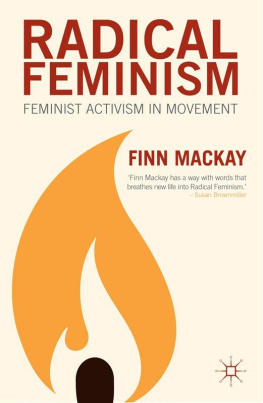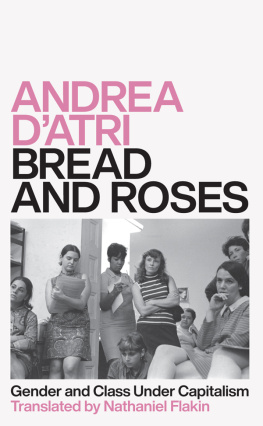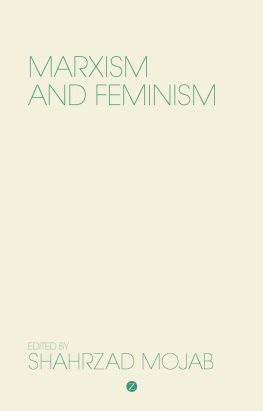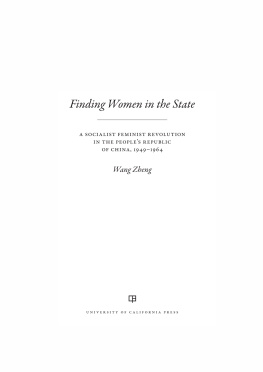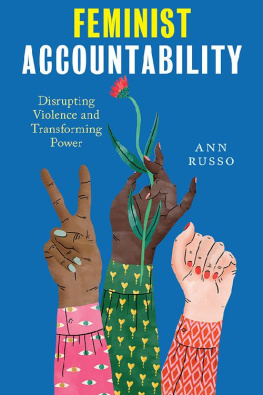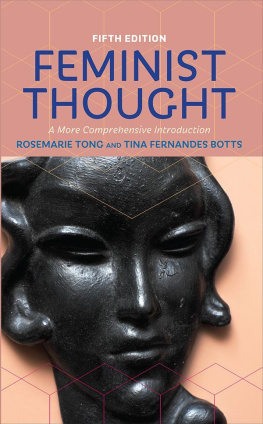Contents
Guide
Socialist Feminism
I do not know of any other book that so effectively explains socialist feminism and brings it into conversation with global social movements. There is a twenty-firstcentury timeliness and urgency to Afarys cogent and expansive case. Attendant to structures of capitalist accumulation and alienation, she considers how they are playing out in a global pandemic, planetary climate crisis, the oppression of Black lives, and the appropriation of reproductive labour. At a time when feminism is under fire, Afary has given us a powerful teaching tool!
Rosemary Hennessy, author of Materialist Feminism and the Politics of Discourse and In the Company of Radical Women Writers
Frieda Afary is brilliant in this powerfully relevant critique of authoritarianism, capitalism, sexism, racism, and other forms of tranny. She methodically unpacks the historically complicated plethora of gender, race, and class theories to show us the way toward a contemporary approach to socialist feminism that is revolutionary. Afary presents a radical vision that challenges us all to think more critically toward reimagining and recentering the world of womyn and a world without prisons. Her analysis centers racial justice that is anti-heteropatriarchy, anti-oppressive, anti-sexist, and transformative.
Romarilyn Ralston, Black feminist abolitionist and Executive Director of Project Rebound, California State University, Fullerton
I highly recommend this very readable yet highly rigorous retelling and refiguring of socialist feminism. Afarys claim that humanism is far more flexible than the version that was dismissed in the 1980s is provocative and compelling. The book engages poststructural theory, as well as race and sexuality, and will be useful for scholar-activists in thinking through some of the most vexing questions posed by socialist feminism.
Judith Grant, Emerita Professor, Ohio University and co-editor of New Political Science: A Journal of Politics and Culture
When many of us are feeling discouraged with the state of our countries and of the world, Frieda Afarys timely book shows the way to understanding, consciousness, and activism. This book can help prepare young people to improve societies. As the grandmother of two African-American females, I am profoundly grateful for this amazing volume.
Mary Elaine Hegland, Professor of Anthropology, Santa Clara University
Frieda Afary has dared to challenge the world of intellectuals to define a new action paradigm. How do women protect themselves? Afary debunks the distortions in the self to other relationships, and critically analyses the conditions leading us toward peril and destruction. Whether you read this book all at once or in small settings with friends, you will be better prepared to live within the 21st century.
Wonda Powell, Emerita Professor of History, Los Angeles Southwest College
Socialist Feminism
A New Approach
Frieda Afary

First published 2022 by Pluto Press
New Wing, Somerset House, Strand, London WC2R 1LA and Pluto Press Inc.
1930 Village Center Circle, Ste. 3-384, Las Vegas, NV 89134
www.plutobooks.com
Copyright Frieda Afary 2022
The right of Frieda Afary to be identified as the author of this work has been asserted in accordance with the Copyright, Designs and Patents Act 1988.
British Library Cataloguing in Publication Data
A catalogue record for this book is available from the British Library
ISBN 978 0 7453 4775 2 Hardback
ISBN 978 0 7453 4773 8 Paperback
ISBN 978 0 7453 4777 6 PDF
ISBN 978 0 7453 4776 9 EPUB
This book is printed on paper suitable for recycling and made from fully managed and sustained forest sources. Logging, pulping and manufacturing processes are expected to conform to the environmental standards of the country of origin.
Typeset by Stanford DTP Services, Northampton, England
Simultaneously printed in the United Kingdom and United States of America
This book is dedicated to the memory of Audre Lorde
Contents
Acknowledgments
First and foremost, I would like to thank my mother, Anvar Pirnazar Afary, for her love, guidance, support, and for encouraging me to pursue my passion for philosophy.
My experience as a student of Raya Dunayevskaya, founder of Marxist-Humanism in the United States, was a rewarding, life-changing and formative one which planted the seeds of many questions and ideas developed in this book.
Seminars on Aristotle, Kant, Hegel, Marx, Critical Theory, Simone de Beauvoir, with David Ozar, Victoria Wike, James Blachowicz, Ardis Collins, David Schweickart, David Ingram, Thomas Sheehan, and conversations with Judith Wittner, Hollace Graff, Julie Ward, Olufemi Taiwo and students at the Philosophy Department and other departments at Loyola University Chicago as well as a seminar on Hegel with Stephen Houlgate at DePaul University greatly expanded my horizons. Classes on African American Studies, African and Latin American Studies with Sterling Plumpp, Charles Branham, Ibrahim Sundiata, and Otto Pikaza at the University of Illinois at Chicago expanded my knowledge of the profound contributions of Africans, African Americans and Afro-Caribbeans to humanity. During my undergraduate years at UCLA, I also learned much from classes with feminist professors, Nancy Henley, Blanche Wiesen Cook, and Middle East scholar, Nikki Keddie. All of the above-mentioned classes and conversations were mind-opening and planted further questions to be explored over the course of the ensuing years.
Maggie Johnson, Senior Librarian at the Palms-Rancho Park Branch of the Los Angeles Public Library, and my supervisor, taught me a great deal about the intersection of race, gender, and class. For 15 years, she gave me creative ideas and full encouragement to organize author programs, book discussions, community panels, and philosophy classes, all of which also helped shape this book.
Wonda Powell of the Department of History at Los Angeles Southwest College offered enormously helpful suggestions in revising my syllabus for a community class series on Socialist Feminism: From Analyzing Oppression to Theorizing Liberation in 201819 at Art Share Los Angeles. I learned much from her participation in the series and from all the socialist feminism class participants. I am also indebted to Wonda for many illuminating conversations over the past nine years on African American history, philosophy, world politics, and Marxs Capital.
Michele Welsing and Yusef Omowale, directors of the Southern California Library, allowed me to host social justice panel discussions at the library, including a class series on the 150th anniversary of Marxs Capital, which also helped shape this book. Their seriousness, openness to international struggles, and commitment to human emancipation are very much appreciated.
Farzaneh Raji, former political prisoner and socialist feminist in Iran, collaborated with me in translating Heather Browns Marx on Gender and the Family. In the process, we had some mind-opening exchanges via email. Ziba Jalali, publisher and founder of Shirazeh Press in Iran, courageously published the book in Persian and organized a public meeting on it at a bookstore in Tehran.
Farah Ghadernia, Iranian socialist feminist and friend, has exemplified the resistance of Iranian women in her own life and has written about the painful daily struggles of women factory workers, sex workers, and homeless women. Her interviews with homeless women about the gender violence that landed them on the streets, and the daily violence that they endure, kept reminding me of the shared pains and dreams of women around the globe.

